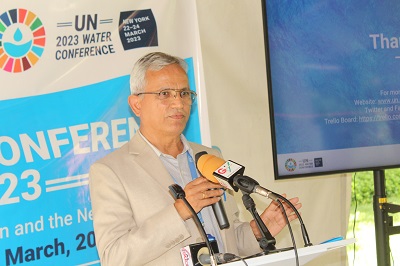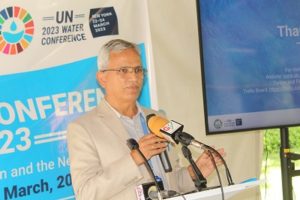In Ghana, one person dies every hour from Water Sanitation and Hygiene (WASH) related diseases that are preventable.
As a result, the United Nations (UN) is calling on authorities to, as a matter of urgency, salvage the situation by increasing investment in the WASH sector to make safe water accessible to every member of the public.
The Chief WASH, United Nations Children’s Fund (UNICEF) Ghana, Mr Ramesh Bhusal, who made the revelation at an engagement with the media ahead of UN’s 2023 Water Conference, said poor sanitation conditions posed serious public health risks, therefore prioritising WASH services in the country would help save lives.
He stated that Sub-Saharan Africa was far behind the global average, where one in three people still relied on unprotected water sources and two to three persons used unsafe sanitation facilities.
The sanitation situation in Ghana, he said, was very poor with only 25 per cent of the population having access to basic services, about 57 per cent using shared public facilities and 18 per cent openly defecating.
According to Mr Bhusal, water was vital to every aspect of human survival and well-being, the economic development and prosperity of every nation.
He, however, expressed regret that” this fundamental human right is not within the reach of many.”
While there were reasons to celebrate remarkable achievements the world had made in improving access to water and sanitation, he noted that the progress made so far was “generally slow and highly inequitable,”, especially for Sub-Saharan Africa.
He expressed the fear that due to Ghana’s proximity to the Sahel Region and position as a safe haven for people displaced from the Sahel, the country was going to face more problems relating to the already inadequate WASH services, especially in the Northern regions.
Touching on what the UN was doing to support Ghana’s WASH sector, DrBhusal revealed that the UN in Ghana was supporting the government to realise access to safe and sustainable WASH services by all, including children and their families through capacity building, modelling innovative service delivery approaches and system strengthening through evidence-based policy, strategy and guidelines.
“The overarching aim of the UN in Ghana is to ensure no child goes to school without functioning WASH facilities and no women have to give birth in health facilities without functioning toilets and washrooms,” he added.
A representative of the Council for Scientific and Industrial Research (CSIR) Water Research Institute (WRI), Dr Anthony Yaw Karikari, on his part described Ghana as a water-stressed country, saying, the proportion of people living in communities where there was a scarcity of water kept growing.
He stated that with the increase in human activities, especially illegal mining around rivers, water sources were becoming polluted and could not be used for drinking and other purposes without treatment.
Though Ghana had made some strides in establishing institutions with supportive policies and legislative frameworks, he said implementation and enforcement appeared to be challenging.
In furtherance, Dr Karikari stated that water management systems for planning, developing and managing water sources were critical for reforming the sector and ensuring water security for all.







